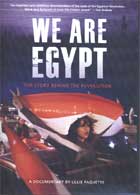
We Are Egypt: The Story Behind the Revolution 2013
Distributed by TDC Entertainment, 220 East 23rd St., Suite 405, New York, NY 10010
Produced by Misha’al Alomar and Lillie Paquette
Directed by Lillie Paquette
DVD, color, 85 min.+ 82 min. of extras
Jr. High - General Adult
Human Rights, Activism, Nationalism, Sociology, Democracy, Middle East, United States, Egypt, Arab Spring
Date Entered: 05/22/2014
Reviewed by Malcolm L. Rigsby, Department of Sociology and Human Services, Henderson State University, Arkadelphia, ArkansasEgypt, like much of North Africa and the Middle East has for over a century felt the presence of the west in the form of first colonialism and now neo-colonialism which harnesses the region economics linked with globalizing power structures. As noted for over 40 years the west, primarily the United States, has dominated the power struggles within Egypt through economic and military support of the Mubarak regime. Thus, funding of ventures that critically analyze this relationship and the developing nationalism within the peoples of the region are no doubt difficult to obtain. We Are Egypt represents yet another success story of how filmmakers are using the technology such the internet and mobilizing web sites like Kickstarter to fund costs associated with post-production of film. Ironically it is the link to the Internet and its ability to create a public forum or venue of networks for association and interaction that formed at least in part the firm foundation by which the revolt by the Egyptian people forced the division of the governing powers and the ultimate capitulation of Hosni Mubarak from office. This film is instrumental in providing knowledge about the power of the media in assisting social change. Both independent filmmakers and the technology of the Internet through social media websites can do four things in assisting social change: first, to make the public aware of the wrongs done to indigenous people about the world; second, to foster the belief that the wrongs occurring are associated with globalization and its two primary components, which are politics and economics. These first two may be collapsed as making the public “informed” and instilling in them the belief that the status quo is “not the right thing to be happening”. Once this is established there is need to get people not only to believe the wrongs exist, but that they cannot simply sit on the sideline and watch, they must become active and take part in some way, whether by spreading the news, economic support, or actual physical participation in bringing about a change in the status quo. Hence, as this film demonstrates the third way media assists social change is to spur people to take a chance and join or mobilize with the movement; to take a stand and put life and limb on the line. Last, each mobilization for change will face challenges. As Paquette voices at the end of the film, even seeming success of a movement may in its own right present a challenge. In this case the resurgence of the military and unseen forces that conflict with the elections seem to be challenging the success of February, 2011. Those that support change must continually seek to provide knowledge and inspire new support and reignite mobilization in order to fight against and delegitimize those counter-revolutionists and the ones that would like to create power/authority positions for themselves.
Paquette is to be applauded for her persistence in speaking with the people, the activists and chancing her own life in filming the almost 14 months prior to the January uprising. In part it is her recognition and filming of these agents of change that helped to bring knowledge, sense of wrong and desire to mobilize and take a stand to the forefront of the January/February strategy that forced Mubarak from office.
This film intriguingly drew me into the dialogue and scenes as Paquette eloquently narrated the events that took place over her 14 months of camera work. Video and audio are excellent and editing creates a smooth and exciting depiction of the events and the lives of those who shared lived experiences about the uprising.
We Are Egypt sponsored Trailer via YouTube with Lillie Paquette.